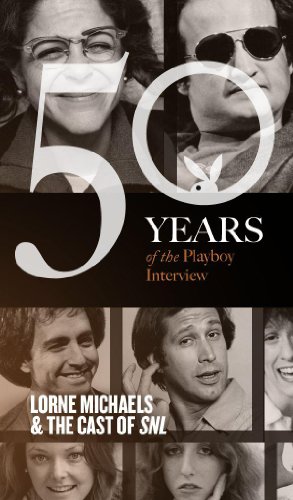
I'm quite enjoying "The Playboy Interviews" - Playboy magazine does have a history of doing topical, groundbreaking interviews. Collecting them gives a nice in situ peek at the life and times of various folks over the past 50 years or so.
I am not reading them in any particular order - I find an interesting interview, read it, and find another.
As of now, I've covered Martin Luther King Jr., which is right in the middle of his historic marches in the south, prior to the "I have a dream" speech in Washington. Offers a nice reminder of how recently things were clearly race-divided in the U.S., and how strong the anti-integration movement was.
The Beatles, and John Lennon-Yoko Ono offer compelling reads as well. The Beatles were pretty early in their fame, so much of the interview provides insight into how problematic "instant fame" is, and how long it takes to become "instantly famous". The Lennon-Ono interview was very close to John's death (not sure of the interview date, but the publication date is 1 month post his murder by Chapman). The interview was related to the John coming back to recording for "Double Fantasy". It does talk about the Beatles years, the odds of getting back together (virtually nill by John), the fact that the individual Beatles members still kept in touch (i.e. weren't enemies) but had drifted as their lives diverged from the "always together" early days. John expresses some resentment toward George, who he felt has slighted John's involvement in George's career growth in the Beatles years, and toward Paul who didn't seem to understand why John and Yoko were tied at the hips.
I am a big SNL fan, so there is an interview from the early years (late '70's) with the entire SNL staff, probably 2nd or 3rd year (Chevy had left, Bill Murray on staff, reference to their fight behind the scenes, which I believe was 2nd year of the show). A later interview with Lorne Michaels is a nice read as well - he had just returned to SNL after leaving, and was dealing with cancellation (which was rescinded through begging) and was experiencing the highest ratings of their tenure up to that time. He talked about how difficult it was to deal with the cast leaving, some lingering tension as SNL became a "star maker", a stop-point to better things, instead of a destination in and of itself. Steve Martin garnered two interviews, one as the stand-up guy and one as the later writer/director of movies and retired stand-up guy. I find Steve Martin endlessly interesting as well - I remember him at his peak of stand-up fame (though didn't realize how odd and difficult making a stand-up career was before widespread local comedy clubs became the norm), I really liked his movies (particularly "the Jerk", "Roxanne" and "Parenthood"). I also like his banjo playing and music career. I find him to be interesting because he is basically a "meta performer" - he designs his input by understanding the media in an academic manner, and he understands what he can bring to the table to make a unique contribution. His plan from the early days was to use the stand-up to drive the movies, and use the initial movies to transition his stand-up to celluloid and use that experience to move toward different and complex (e.g. less one-dimensional) roles. Tina Fey is interviewed on her own as well, in her post SNL 30 Rock period - also a very interesting person who discusses her transition from writer to SNL Update performer to star of a TV series (and the associated angst and discussion points of each).
Animation creators come into the fore as well - Seth McFarlane, Parker and Stone of South Park both captured at the height of their animated fame (just reading Seth now, Groening is next).
All in all, these interveiws are well done, and certainly lead to pick and choose reading - most are 20 min to 1/2 hour reads, though MLK seemed to take an hour or so. I hope this comes out as an audiobook, as most seem to have been tape recorded at source - it would be intersting to hear John Lennon talk about the Beatles history, and MLK talk about the struggles in the south.
